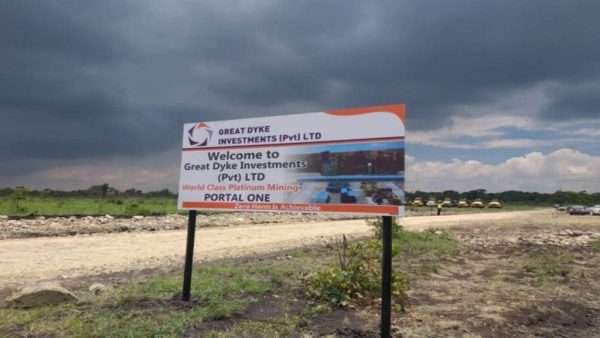Russia’s Vi Holdings says it has exited from Great Dyke Investments (GDI), leaving the futute of what is supposed to be Zimbabwe’s biggest platinum project at risk.
Vi Holdings is ceding its 47.8% stake to its local partners, Kuvimba Mining House and Fossil, according to Vi Holdings representative Igor Higer.
In a statement, GDI said its decision to exit the project is “in connection with the global sanctions of Western countries against Russia, which naturally also applies to Russian investments abroad”. Leaving GDI would “create favourable conditions for further development of the project”, the company said.
Russia’s involvement in Ukraine had made GDI’s already tough fundraising mission impossible.
GDI had planned to mine the first ore in 2021 and at its peak produce 860,000 ounces of platinum. This would have made it the biggest mining venture in Zimbabwe.
However, GDI saw a series of missed fundraising deadlines, and the collapse of funding proposals under sanctions on Russia put on a lid on the project.
In 2020, GDI announced that the African Export-Import Bank (Afreximbank), the lead arranger for project funding, had completed due diligence on the project, allowing the company to start raising capital.
But GDI Chief Executive Officer Alex Ivanov said coronavirus delayed project fundraising, which was originally due to be completed in 2021. Financing of a US$665 million first phase development was pushed to the first quarter of 2021.
In December 2020, in a bid to raise capital, GDI sold a 4.4% stake for US$30 million to Fossil Mines as COVID-19 disrupted fundraising.
That sale valued GDI at US$680 million.
Vi Holding, owned by Russia’s Vitaliy Machitskiy, has had to carry the burden of exploration alone, spending US$100 million on pre-development.
Needing funding, GDI reportedly tried to sell the project to Implats, which runs Zimplats. But Implats turned down the offer over concerns about the ownership of GDI, especially the involvement of Kuvimba.
Sanctions on Russian businesses over Ukraine made GDI’s efforts to raise capital even harder. Russian companies are no longer able to raise capital in London or New York, making Afreximbank’s task virtually impossible.
Signs that funding was hard to get showed as work stalled at the site, and the company started to seek out cheaper ways to develop the mine.
Kuvimba CEO Simba Chinyemba recently said the strategy for the project has had to change.
“The original project was modelled on the possibility of underground mining,” Chinyemba said. “After further exploration and analysis common to projects such as this, it is now believed that the orebody may be more amenable to an open-pit project. GDI is thus remodelling the whole Darwendale project in order to take this into account.”
Russia sanctions: local impact
The failure of GDI is a major knock for Zimbabwe, which has placed mining at the centre of efforts to end the economic crisis.
Sanctions on Russia, which also ban Russian companies and businesspeople from moving money through UK banks, may also affect investment plans by Alrosa. The world’s biggest diamond company is currently exploring diamonds in Zimbabwe.
Alrosa signed an agreement in 2019 with the state-owned Zimbabwe Consolidated Diamond Company (ZCDC) to jointly explore for diamonds in Zimbabwe. It has 35 prospecting special grants. It is now also under US sanctions.
Alrosa plans to invest at least US$9 million each year in greenfield exploration and assessing the diamond content of any kimberlite pipes that are discovered.
Zarubezhgeologiya, the operation of the international projects of Russian state company Rosgeo, might be brought in to work on the geological mapping of Zimbabwe.
.png)




